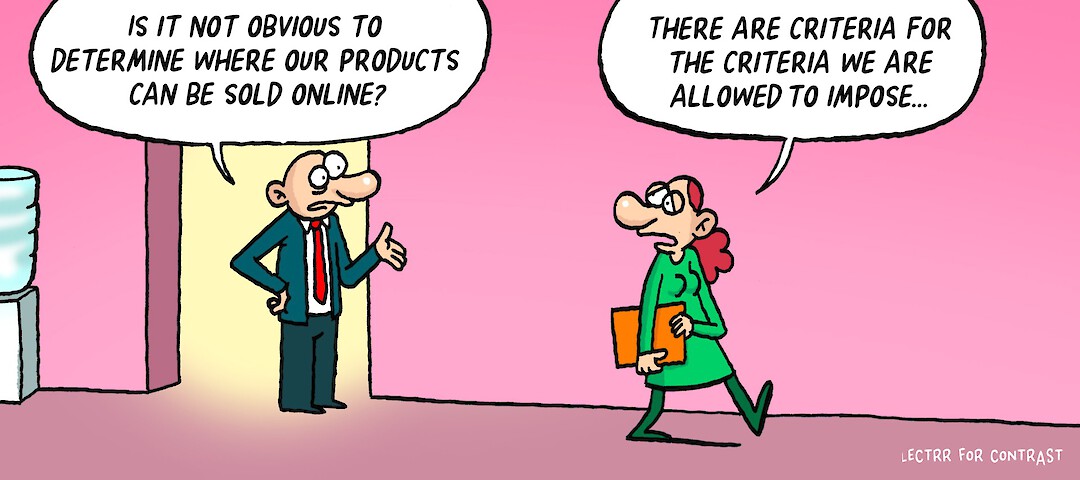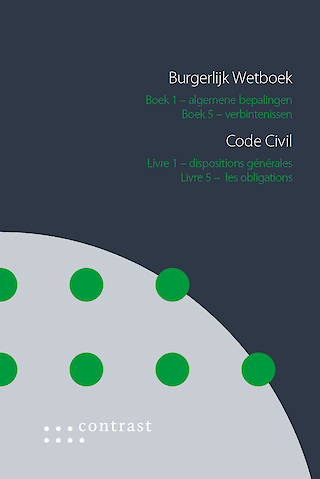In the Picture

Online sales and advertising: anytime, anywhere, but not anyhow
June 2023Imagine…
Your company sells its products via its own webshop as well as through independent distributors, who in turn sell your products both online and in other ways.
Some distributors offer your products via online marketplaces, including Amazon and eBay, and advertise your products on search engines and price comparison websites, such as Google Shopping, PriceGrabber and Shopping.com.
You would prefer to prohibit these online sales techniques because they do not conform to your company´s quality policy. But you know that the competition rules are strict when it comes to prohibiting or impeding internet sales. However, in a recent competition law compliance training you heard that new rules on internet sales had recently come into effect.
You want to know where things currently stand, so you seek advice from your legal department on the most important dos and don´ts for internet sales. In plain English: what is permitted these days and what isn´t?
A brief clarification.
The transitional period for the updated European distribution rules came to an end on 1 June 2023, so all distribution agreements must now comply with the new rules in order to enjoy a safe harbour under competition law.
The new regime gives a prominent place to the rules on online sales. For example, it introduces a new so-called ´hardcore restriction´, that is always excluded from the safe harbour and stands on the black list, in particular when suppliers prohibit their distributors and customers from effectively using the internet in order to sell the contract goods or services.
All direct or indirect restrictions on online sales are banned. For example, a supplier may not oblige its distributors to ask permission before online sale transactions are conducted on their website, or forbid them to use the supplier’s trade marks or brand names in their online shop. Restrictions of this kind are regarded as illegal customer or territorial restrictions.
By contrast, certain other restrictions are permitted, e.g. restrictions on the manner in which distributors and their customers sell or advertise the products online (“how” restrictions).
Thus a supplier may always impose quality criteria for the online sale of its products, for example concerning the way in which they must be depicted in the online shop, and in general in order to guarantee the quality and character of the online shop.
In so doing a supplier is allowed to impose on its distributors and their customers a prohibition on the use of online marketplaces, so long as distributors and their customers can still effectively make use of the internet by means of their own online shop and by means of online advertising. Note that the safe harbour only applies when neither of the parties has a market share of more than 30%. Above 30% it becomes more difficult to ban the use of online marketplaces, certainly when the supplier itself makes use of them to sell its goods.
A supplier can also impose quality criteria on the online advertising for its products. This applies for the use by the distributors and their customers of online advertising channels such as search engines and price comparison services. A supplier can even prohibit the use of certain search engines and price comparison services if, according to the supplier, they do not meet certain quality standards. In order not to lose the safe harbour, however, a supplier may not prohibit the use of an entire online advertising channel and impose (e.g.) a total ban on the use of either search engines or price comparison services. This would be regarded as a restriction on the actual use of the internet, and that is a prohibited hardcore restriction.
Concretely.
- On 1 June 2023, the transitional period for the application of the updated European distribution rules expired and all distribution agreements must now comply with these rules in order to enjoy a safe harbour under the competition law. The new regime applies until 31 May 2034.
- Restrictions that suppliers impose on their distributors and their customers with regard to their actual use of the internet for selling the contractual products are on the black list and cannot enjoy the safe harbour.
- Within the safe harbour, suppliers may impose quality requirements on the use of the internet by their distributors and customers. For example, they may impose a prohibition on the use of certain online sales channels, such as online marketplaces - on condition, however, that neither of the two parties has a market share exceeding 30%.
- Suppliers can also impose quality criteria on the online advertising for their products, including a ban on the use of certain search engines and price comparison services that do not meet the supplier´s quality standards, provided that the ban does not amount to a total prohibition on the use of an online advertising channel.
Want to know more?
- You can find the new Block Exemption Regulation (the “safe harbour”) and the related guidelines of the European Commission here.
- The Distribution Law Center is the go-to online platform for distribution law. It is composed of a network of specialists from 27 countries and is led by contrast. You can follow us free of charge via the DLC website and LinkedIn.
- This “In The Picture” is also the start of something new: on a regular basis, the Distribution Law Center will address interesting and concrete questions arising from our competition and commercial law consulting practice on distribution in to-the-point news updates. You can already sign up here.
- On 12 October 2023 the Distribution Law Center will be holding its second online seminar. You can already register free of charge for this annual update on the most relevant developments in the field of distribution agreements by sending an e-mail to dlc@contrast.law.
- Do you wish to receive an update on recent distribution law developments? Then quickly check out contrast’s Dutch webinar “Distributie anno 2023” here.
Please consult our website or contact one of our team members if you have questions or require more information:













